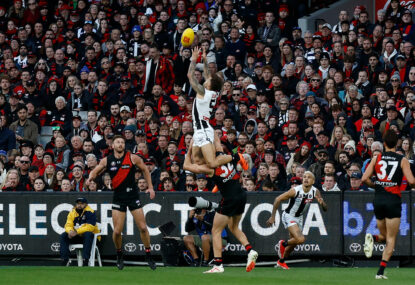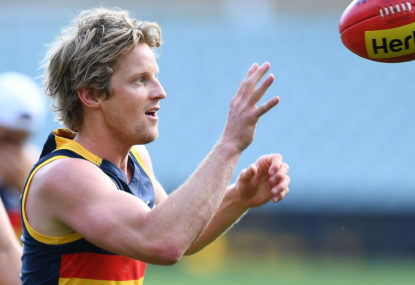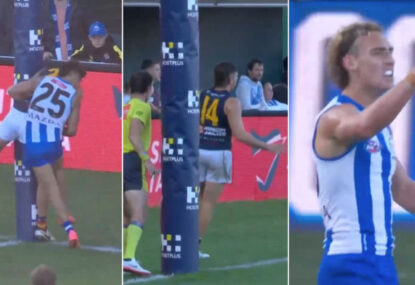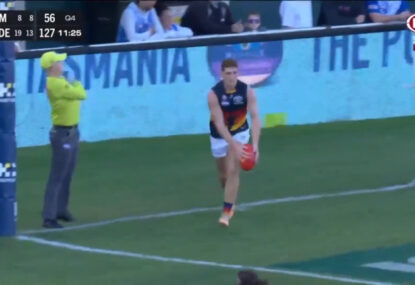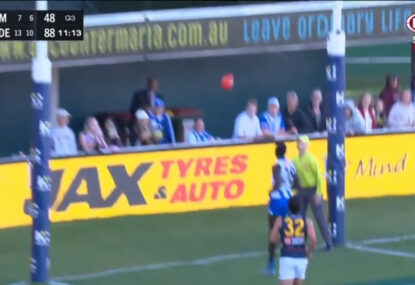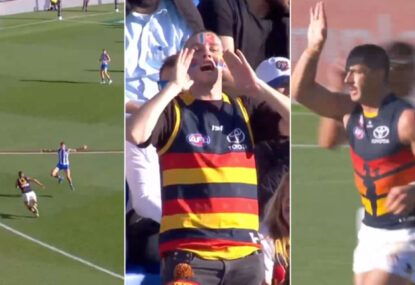For three and a half quarters on Thursday night, it was the same old Adelaide.
Unambitious with ball in hand. Slow in movement. Horrendous by foot even with those former two traits. And a midfield which, despite a stunning first quarter, was getting slowly but surely dominated by a more battle-hardened, more ferocious and more skillful opposition brigade.
This sort of footy wasn’t enough to come close to Gold Coast, Geelong or Fremantle in the first three rounds. It was never going to seriously trouble a Melbourne side looking as miserly behind the ball as they were in their premiership year.
Up until three quarter time, the Crows’ latest dire display manifested in one scarcely believable stat: they had scored six points in total from turnovers. Six. And it wasn’t as if they were butchering set shots galore like they did against the Cats – the few chances they had were scrappy, on the run or from long range, and rarely if ever truly threatening.
It’s reflected quite poignantly in the Crows’ position on this fascinating ‘Expected Scores’ chart, with the Crows ranking only alongside the Dees themselves (who, incidentally, have been kicking goals out of their proverbials this season) for expected score per shot.
With slow ball movement, teams can quickly stack numbers behind the ball, clogging space for Izak Rankine and Josh Rachele to work their magic at ground level and making it hard for Taylor Walker or Darcy Fogarty to mark inside 50. With poor kicking, they’ll turn it over with that precious last kick into attack, or, as it proved for much of the first half against the Demons, even further up the ground, often with disastrous results.
The Crows and Matthew Nicks tried, at least, to address that ‘unambitious’ rider, biting off kicks galore into the corridor – and they failed, because it was ridiculously easy to read, and without the speed of ball movement necessary to accompany it.
The Crows marked at half-back, or on the wing, slowed up, went back, and only when the Dees were set up just as Simon Goodwin wanted them did they centre a pass so telegraphed Stevie Wonder could have seen it coming.
Here’s another stat for you – the Crows, to half time, had generated an inside 50 from just 15 per cent of their defensive 50 chains. With the Dees intercept-marking everything, from Steven May to Jake Lever to even the highly underrated Judd McVee, little wonder; but the ball came their way essentially exactly as they wanted it.
At 0-4, entrenched in the bottom four and ranking as the second-lowest scoring side in the league ahead of only West Coast, you’d think based on the above I’d be recommending taking the Crows’ season out to the back paddock and Old Yellering it into the forever and beautiful sky.
But something changed in the last nine minutes that has me holding off loading the shotgun just yet. There was still a lot wrong with what they were doing, but for a brief moment, the threatening, dynamic Crows of 2023 were visible – and it left the Dees noticeably rattled.
It starts at a stoppage inside the Demons’ 50, with eight minutes and 55 seconds on the clock. What’s noticeable as both teams jostle for the ball is intent: first Rory Laird, and then Luke Nankervis, go against the Crows’ trend for the rest of the night – their first instinct when gathering the ball is to try and move the ball inboard, targeting the corridor.
Laird runs into a pair of Demon tackles and surrenders the ball; Nankervis’ handball is intercepted by Kade Chandler, whose tap away gives Melbourne back possession. The Crows weren’t going to suddenly get back to being world-beaters overnight. But it was a start.
Because when Christian Salem gathers and wobbles a kick into the corridor, Jordon Butts’ first instinct when spoiling is the opposite of what most defenders do: he spoils even further inboard, the dangerous spot where a single lurking Demon could have put the result beyond doubt.
But Ed Langdon is so surprised by where the ball ends up that he overruns it, and what happens next proves once again that fortune favours the brave. The loose ball is gathered by Langdon’s opponent Ned McHenry, who streams right up the guts – exactly where the Crows wanted it to begin with – and hits up Walker virtually in the centre square.
Suddenly, the Crows have an open play, options galore, and a Dees defence not given the time to set up and caught scrambling.
Rankine’s direct opponent, McVee, has sprinted back to fill the defensive 50, leaving the No.23 free on the half-forward flank for Walker to pass him to. Replacing McVee, Christian Salem does a great job to hold Rankine up, closing off the corridor and denying him the chance to get back onto his right boot – but when he at last kicks inside 50, the play has still been quick enough and the kick well-directed enough that he’s effectively going to a one on one.
It’s here that the fatigue of having busted a gut 150 metres tells on Lever; having intercepted everything all night, and matched up on the much smaller Rachele, you’d expect the big Demon to either mark this one or spoil over the line.
Instead, he panics – he takes his eyes off the ball, stumbles a little, misjudges where the ball will land, and then when he realises he’s in trouble manhandles Rachele and throws him out of the way in one of the night’s more obvious free kicks, as shocked as Lever seemed when it was paid.
Rachele goals, and suddenly, having looked just about cooked at three quarter time, the Crows are just 15 points behind and in with a shot. As it happens, both their goals for the quarter have come from turnovers, after zero up to that point.
From the next centre bounce, whether by luck or by design, the Crows’ other major issue was also bypassed.
The Crows this year have had a worrying tendency to, when under pressure or not, blaze the ball indiscriminately inside 50 from stoppages. It’s why they’ve rivalled the Eagles for scoring impotency despite ranking fourth for average inside 50s behind the far higher-scoring Sydney, Port Adelaide and Geelong, and why it took them until the second term to score a goal from a clearance despite absolutely tearing the Dees a new one in that stat to quarter time (leading 16-9).
Sub Sam Berry gathers the ball, with his fresh legs enough to get away from a despairing Alex Neal-Bullen tackle and handpass to the running Laird. Instead of whacking it in as fast as he can, though, the veteran lowers his eyes despite Jack Viney closing in, and – and I’m fairly sure Viney’s tackle actually helped the kick find its target – hits up Rankine on the lead.
Again, Rankine is quick to move on – he wheels onto his right foot, and centres the ball beautifully, right into the leading lane of Walker, who has Tom McDonald done cold. It should, by all rights, be a set shot for the Crows’ most accurate kick.
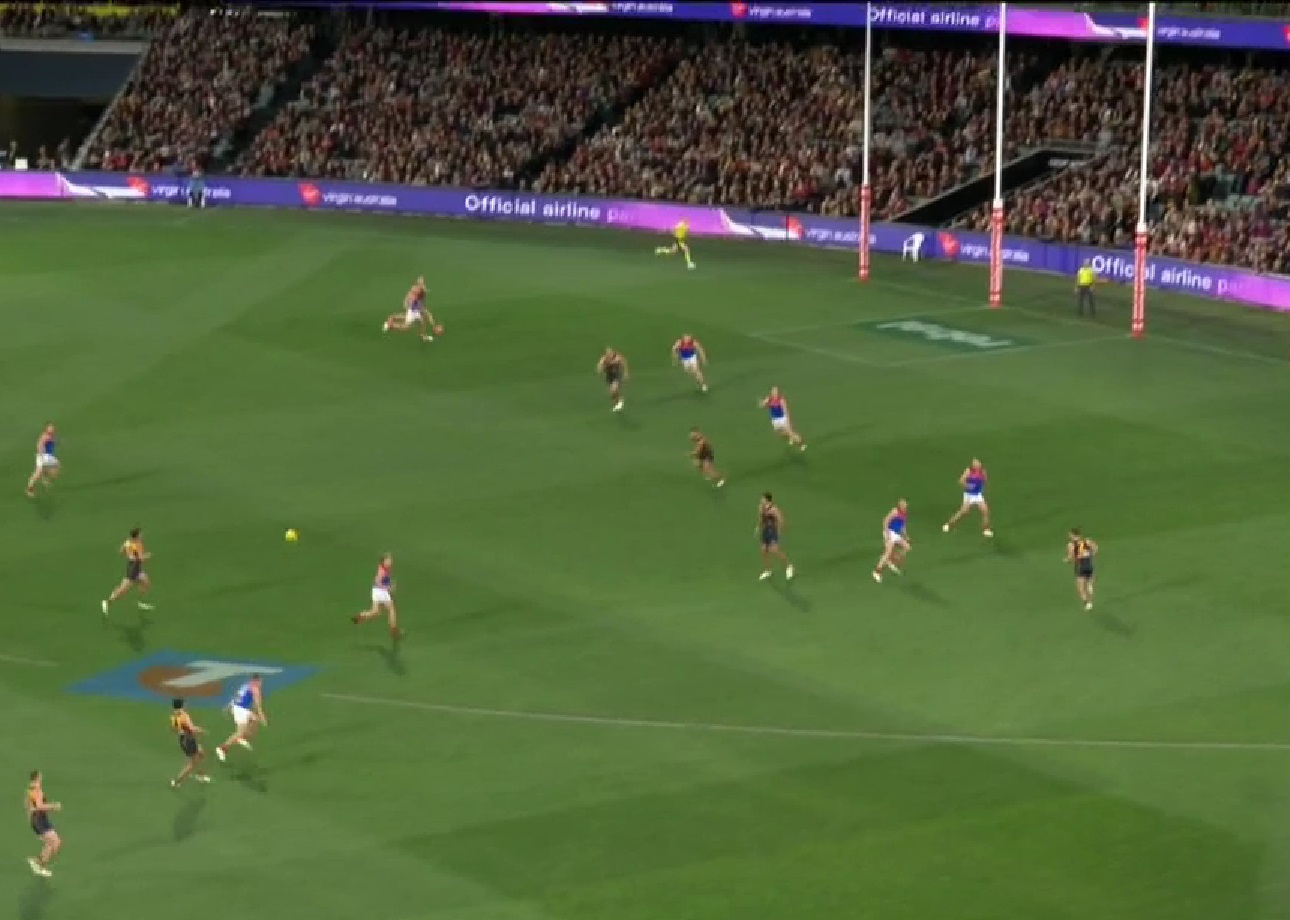
(Image via Fox Footy)
Except, at the last second, for reasons only known to himself, Rachele thinks it’s meant for him, and with Walker mere centimetres away from clutching it, extends an arm and knocks it away from them both.
He does well to regather when the ball hits the ground and shrug a Tom Sparrow tackle, but the damage is done: the shot he gets away is under pressure, and on the goal line, Blake Howes is able to spoil through for a rushed behind. The margin is 14 points. It should be nine.
The Crows have, with dash and dare, succeeded twice in a row in making the great Melbourne wall look truly vulnerable. With over seven minutes to go, they are in this game up to their eyeballs.
It was then that the bad Adelaide, or at least its most damaging traits, re-emerges.
Adelaide Crows
v
Port Adelaide Power
AFL : Head To Head
Thu, 2 May 2024, 19:30
Carlton Blues
v
Collingwood Magpies
AFL : Head To Head
Fri, 3 May 2024, 19:40
Sydney Swans
v
Greater Western Sydney Giants
AFL : Head To Head
Sat, 4 May 2024, 13:45
St Kilda Saints
v
North Melbourne Kangaroos
AFL : Head To Head
Sat, 4 May 2024, 16:35
Melbourne Demons
v
Geelong Cats
AFL : Head To Head
Sat, 4 May 2024, 19:30
West Coast Eagles
v
Essendon Bombers
AFL : Head To Head
Sat, 4 May 2024, 20:10
Richmond Tigers
v
Fremantle Dockers
AFL : Head To Head
Sun, 5 May 2024, 13:00
Western Bulldogs
v
Hawthorn Hawks
AFL : Head To Head
Sun, 5 May 2024, 16:00
Brisbane Lions
v
Gold Coast Suns
AFL : Head To Head
Sun, 5 May 2024, 19:10
* Odds Correct At Time Of Posting. Check PlayUp Website For Latest Odds
What are you prepared to lose today?
For free and confidential support call 1800 858 858 or visit gamblinghelponline.org.au
Looking to gain territory down the wing, Sparrow wobbles a kick back to where the Crows have numbers, and they regather. Leading the race back is young Max Michalanney, whose first instinct is to, of course, go inboard.
His mistake, though, is a poorly directed handpass to Berry, who finds himself beset upon instantly by Jacob van Rooyen. He does well to shrug the tackle and give back to Michalanney, but by this point, he’s been corralled back towards defensive 50, the corridor has been cut off, and the best he can manage is a wide pass to Josh Worrell on the other flank.
It’s here where the bigger mistake comes, and reinforces the lack of damaging, ambitious kickers in the Crows’ backline. The exhausted Dees have left the corridor open, with three Crows running to fill the void. It’s a hell of a risky kick, but the sort of thing you have to bite off when 14 points down, and the rewards further afield have proved to be rich in the last five minutes.
Instead, he goes wide to Nankervis, on the wing, who… stops, waits for Worrell to run on into the space left vacant by the Dees 20 metres further along the wing, and passes it to him. All the while, the dangerous spots – the corridor and 50 metres along the line, to be precise, have been filled. Maddening.
Still, the Crows nearly get away with it. Worrell’s long ball down the line is marked well by Fogarty, who attempts to show all the dare his teammates have just lacked: he turns instantly, targets the corridor, and passes perfectly on the left foot to Rachele just inside 50.
But Worrell and Nankervis’ delays have proven costly; as Rachele looks up, he sees 11 Demons inside their defensive 50, to nine Crows. And of those nine Crows, three are running back towards goal and in no position to call for it.
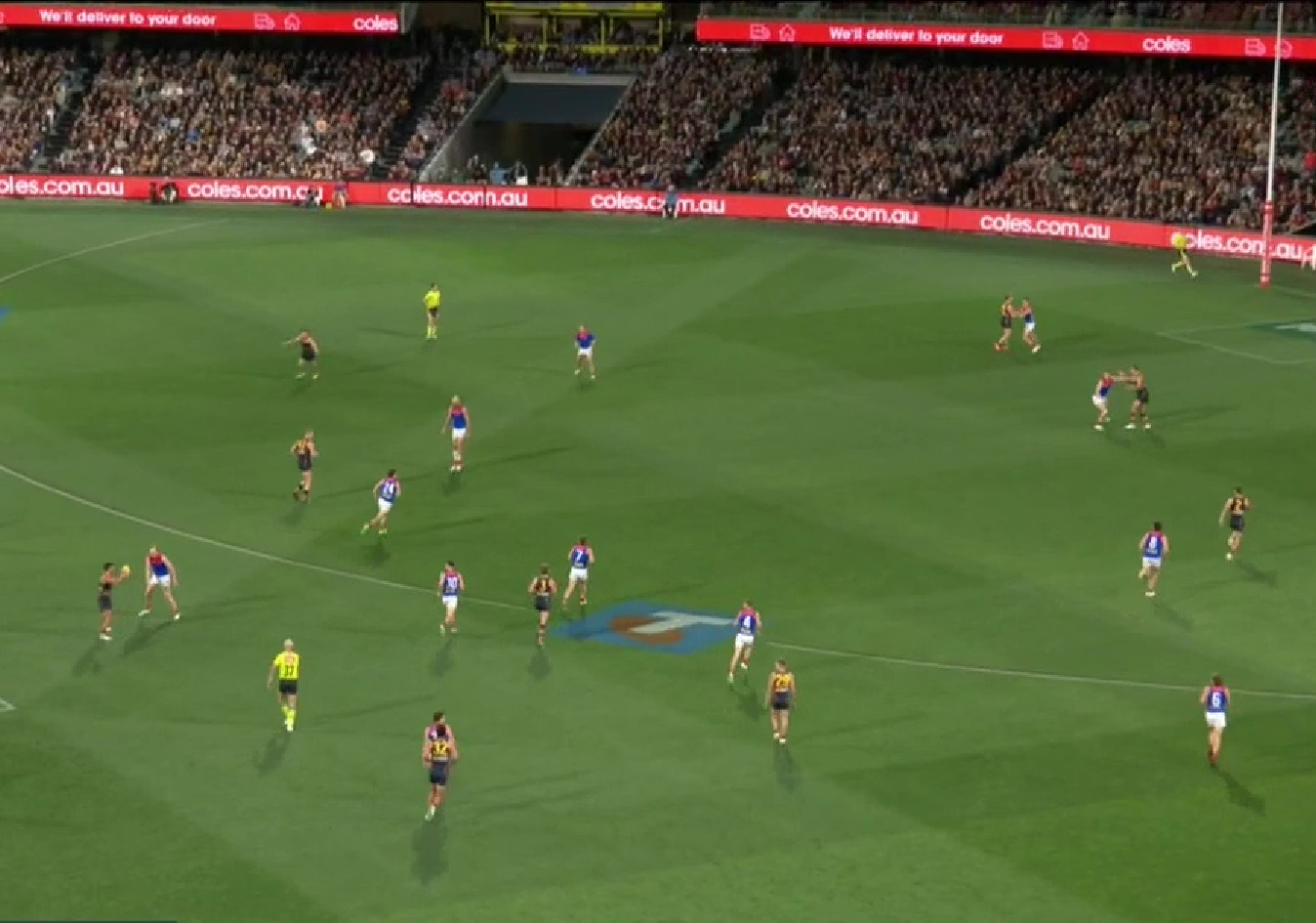
(Image via Fox Footy)
Still, Rachele errs – he picks the worst possible option of the limited few open to him, he bombs it long to the goalsquare, where Walker is in a two on one. Howes does well to engage, McDonald coming back thumps the ball to safety, and while Walker attempts to win a free by falling over, there’s nothing doing.
But Walker is also culpable – earlier in the play, he had a paddock of space ahead of him, and yet still elected to run back towards goal, calling for the ball to be sat on his head. I’m still baffled as to why.
That’s one chance blown. And the Crows can’t afford to waste them.
There’s one further example: with a little under four minutes left, the Crows win a stoppage inside defensive 50, and immediately head for the corridor. Laird handpasses to Berry, who shrugs a tackle, and hits up Rachele.
Salem, again, does well to give Rachele the lightest of shoves as he marks, sending him to ground without giving away a 50m penalty, and soaking up a precious few seconds.
But Rachele is culpable here, too: with time of the essence, and the Crows’ only hope against a watertight Dees defence to move the ball quickly and with purpose, it takes him more than nine seconds from mark to kick. All the while, two teammates wait on the outside loose and screaming for the ball.

When he kicks, it’s long, central, and to a marking contest where Max Gawn has dropped back as the loose man – in short, the wrong spot.
Rankine does brilliantly to first spoil Gawn and then gather the crumb, but like Rachele’s shot a moment ago, it’s a low-percentage snap shot he’s forced to take: it bounces towards goal, and in a one-on-one duel with Ben Keays, Lever is able to tap the ball over the goal line to safety. A rushed behind.
This was, in many ways, the most frustrating of the Crows’ four losses to watch. It’s one thing to be playing bereft of confidence and with little cohesion, and quite another to stumble on a solution, play two minutes of brilliant, game-changing footy against a quality opponent, and then revert to type.
But while the sample size couldn’t be smaller, it’s enough to get me thinking. Maybe the Crows’ season is shot – in fact, it almost certainly is.
Yet where there’s life, there’s hope. Midway through the last quarter against Melbourne, with all hope lost, the Crows found a pulse at last.
And the swiftness with which they suddenly looked intimidating again simply must be harnessed by Nicks moving forward; do that, and maybe, just maybe, a season on death’s doorstep can be miraculously salvaged.
































































































